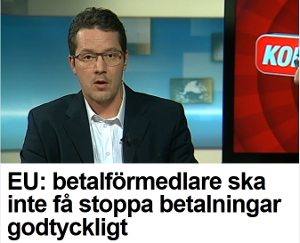Christian Engström's Blog, page 61
November 22, 2012
”EU: betalförmedlare ska inte få stoppa betalningar godtyckligt”
SVT har ett mycket bra inslag om betalningsförmedlarna Visa, MasterCard och PayPal och problematiken kring dem:

Se inslaget hos SVT


Some Scientific Data on Snus

Smokers who switch to snus get almost as good health gains as those who succeed in giving up tobacco completely
Three weeks ago I published an open letter to all anti-snus lobbyists, asking them what scientific studies on snus they have based their opposition to snus on. So far, not a single anti-snus lobbyist has responded, neither the Smoke Free Partnership (who are otherwise very active on the subject), nor any other organization.
I find this rather odd, considering how keen lobbyists in general usually are when it comes to arranging meetings with members of the European Parliament. Since I am genuinely interested in learning why they (and DG SANCO at the European Commission) are opposed to this traditional Swedish smoke free product, I have sent another mail to the Smoke Free Partnership and some other anti-snus lobbyists today, inviting them to meet me in Brussels.
Time will show if they respond, or if they feel that they are not in a position to answer my question.
In the meanwhile, I would like to share a link to a very thorough article arguing in favour of snus as a help for smokers who want to quit, but find it difficult to do so cold turkey.
The article is written by Clive Bates, who is a former Director of the UK public health charity Action on Smoking and Health. Although he now works in an unrelated field, he has written the article expressing his own views out of concern is for smokers who would like to quit but find it hard.
I will cite the beginning of the article here:
Death by regulation: the EU ban on low-risk oral tobacco
Is it right to ban certain types of smokeless tobacco from sale in the European Union? The short and unequivocal answer is ’no’.But surely banning any type of tobacco can only reduce the size of the overall tobacco market and therefore be good for health? No, not at all, it just isn’t that simple…
This post gives my personal take on this important public health issue.
The reason for allowing it on the market is that smokeless tobacco is an effective substitute for smoking, but far less hazardous to health than cigarettes. The chart to the left puts it quite well. It models the effect on life expectancy of switching from smoking to a type of smokeless tobacco (‘snus’ or Swedish oral snuff) at a given age. These are dramatic findings. Given the addictiveness of nicotine and how difficult some smokers find quitting even if they really want to, banning this option amounts to death by regulation. What has gone wrong?
Switching provides a substantial health benefit to smokers who switch, in fact switching is not that much different to quitting smoking altogether. Furthermore, the risks of the product itself (the bottom red line) are quite low (Gartner et al 2007 - see SCENIHR p117). However, these products are banned in law the EU (other than in Sweden), and smokers have been denied the option to switch to this much lower risk way of taking nicotine.
A group of us concerned about public health policy set out the arguments for this in 2003 (Bates et al 2003) and the arguments haven’t changed since. They have only strengthened as more evidence has become available. As Gartner et al conclude:
Current smokers who switch to using snus rather than continuing to smoke can realise substantial health gains. Snus could produce a net benefit to health at the population level if it is adopted in sufficient numbers by inveterate smokers. Relaxing current restrictions on the sale of snus is more likely to produce a net benefit than harm, with the size of the benefit dependent on how many inveterate smokers switch to snus.
Despite this, these products are banned in the European Union under Tobacco directive 2001/37/EC article 8 (other than in Sweden). Worse still, and in the face of abundant evidence that supports the lifting of this ban, the EU appears ready to maintain or extend it in a new tobacco directive (see consultation [PDF see p4-6]) and comments from the Commission (here and here).
This is wrong at many different levels. In the sections that follow, I’ll address three major policy failings under the following headings:
Public health science ignored and abused
Ethics and consumer rights violated
EU legal principles disregarded
As I have said, I would be very interested to hear how both DG SANCO (the General Directorate within the European Commission responsible for the Tobacco Products Directive) and any anti-snus lobbyists would respond to the arguments that Clive Bates presents in his article.


November 21, 2012
Måste politiker ljuga?
Går det verkligen inte att vara öppen och transparent med hur man styr ett land?
Det finns många exempel på regeringar som blåljuger. Geijeraffären, Ebbe Carlsson-affären, tsunami-banden och Egyptenavvisningarna är bara några svenska exempel.
Och nu avslöjas den sittande regeringen med byxorna nere i Saudi-affären. Myndigheter mörkar för att skydda politikerna, regeringskansliet gömmer undan dokument och när allt avslöjas försöker de ansvariga låtsas som om det regnar.
Det är helt uppenbart att detta är ett demokratiskt problem.
För att medborgarna skall kunna bedöma politikernas jobb, så måste vi få veta vad de folkvalda håller på med. Annars är det inte möjligt att göra ett väl informerat val nästa gång vi går till valurnorna.
Det är ett större och allvarligare problem än de enskilda lögnerna i sig.
Tack och lov finns det grävande journalister, aktivister och whistleblowers som Wikileaks. Utan dem hade vi aldrig fått veta vad som skett.
Tänk på saken: Vårt land styrs av människor som hittar på dumheter som det är meningen att folket aldrig skall få kännedom om. Våra politiska ledare håller sig med dubbel bokföring, där de säger en sak utåt och gör en annan sak i hemlighet.
Och det gäller inte bara i Sverige. I EU är det ännu värre. Ta euro-krisen som exempel. Den är en soppa där ingen vanlig människa i dag kan hålla ordning på alla nödlösningar, krispaket och pengaströmmar. Allt Europas 500 miljoner människor förväntas göra är att betala notan över skattsedeln, tiga och lida.
Det är både orimligt och farligt.
…………
Andra om Saudiaffären: SvD, Expressen, Hax,


Amerikanska republikaner funderar förnuftigt om upphovsrätt
Den amerikanska tankesmedjan Republican Study Committee i den amerikanska kongressen publicerade häromdagen ett häpnadsväckande bra dokument där de bemötte ett antal myter om upphovsrättens förträfflighet, och föreslog ett antal alltigenom vettiga reformer.
24 timmar senare var dokumentet i och för sig bortplockat från tankesmedjans sajt, efter att film- och skivbolagen hade krävt det av det republikanska partiet, men det finns att läsa bland annat hos Techdirt, som också ger en utmärkt sammanfattning av innehållet.
I amerikansk politik är det president Obama och demokraterna som är de allra mest rabiata upphovsrättsfundamentalisterna. Det kanske man spontant som svensk tycker är märkligt, men det beror på att det demokratiska partiet har mycket nära relationer med Hollywood och de stora skivbolagen, och får stora belopp i mutor kampanjdonationer därifrån.
Republikanerna dansar i och för sig även de oftast efter upphovsrättsindustrins pipa, vilket ju illustreras av hur snabba de var med att dra tillbaka dokumentet, men om det finns grader i helvetet är de ändå en liten smula bättre än demokraterna på just det här området.
Blotta det faktum att en republikansk tankesmedja i Washington kunde producera ett vettigt dokument om upphovsrätten är ändå en liten ljuspunkt.
Läs mer hos Techdirt


November 20, 2012
Europaparlamentet: Kreditkortsföretagen skall inte få blockera småföretag godtyckligt
Pressmeddelande från Piratpartiet:
Det är ett problem att dominerande betalningsförmedlare som Visa, MasterCard och PayPal blockerar företag och organisationer på eget bevåg. Det krävs objektiva regler för när sådant får ske.
Detta säger Europaparlamentet – på Piratpartiets initiativ – i en rapport om moderna betalsystem som antogs på tisdagen.
Frågan aktualiserades nyligen då de stora amerikanska betalningsförmedlarna enväldigt bestämde sig för att stänga av två svenska företag från möjligheten att ta betalt av kunder på nätet.
- Det är inte rimligt att Visa, MasterCard och PayPal kan besluta att svenska småföretag som säljer skräckfilmer eller sexleksaker inte ska få fortsätta sälja sina produkter på nätet bara för att betalningsförmedlarna är rädda för amerikansk nymoralism, säger Christian Engström, ledamot i Europaparlamentet för Piratpartiet.
- Ett annat exempel är när Visa, MasterCard och PayPal blockerade betalningar till Wikileaks. Det skedde utan lagstöd och skall ses som att de tre företagen hjälpte den amerikanska regeringen att tysta en obekväm röst. Det är inte acceptabelt att privata storföretag har den makten över det fria ordet, säger Engström.
Den aktuella delen av texten fördes in i rapporten (Card, Internet and Mobile Payments) på Piratpartiets initiativ. Tillägget lyder…
32. Europaparlamentet menar att antalet företag vars verksamhet faktiskt är beroende av att de kan ta emot kortbetalningar sannolikt kommer att öka. Parlamentet anser att det ligger i allmänhetens intresse att det fastställs objektiva regler som anger de omständigheter och förfaranden enligt vilka kortbetalningsprogram ensidigt kan vägra godkännande.
Tillägget antogs tidigare enhälligt av Europaparlamentets utskott för inre marknad och konsumentfrågor, där Christian Engström är ledamot. I dag antogs det även av parlamentet i plenum.
- Det behövs fler aktörer och mer konkurrens på betalmarknaden. Men det har vi politiker svårt att påverka. Däremot kan vi sätta upp regler för att dagens dominerande aktörer inte får inskränka vare sig näringsfriheten eller yttrandefriheten på eget bevåg, avslutar Engström.
Länkar:
Christian Engströms inlägg i debatten på måndagskvällen kan ses här (19:37):
http://www.europarl.europa.eu/sed/speeches.do?sessionDate=20121119
Bloggpost: EU måste reglera hur Visa, MasterCard och PayPal får bete sig
http://christianengstrom.wordpress.com/2012/11/13/eu-maste-reglera-hur-visa-mastercard-och-paypal-far-bete-sig/
…………
Others on the subject: Rick Falkvinge, Slashdot, CIO, The Inquirer, Wikileaks

November 16, 2012
Varför måste Gottfrid Svartholm Warg sitta häktad så länge?

Gottfrid Svartholm Warg, även känd som Anakata, i samband med rättegången mot The Pirate Bay 2009
En av The Pirate Bays grundare, Gottfrid Svartholm Warg, även känd som Anakata, sitter häktad sedan han utlämnades från Kambodja till Sverige. Den officiella förklaringen till utlämningen var att han har ett fängelsestraff från TPB-rättegången att avtjäna.
De som vet påstår att en utlämning från Kambodja normalt är rätt odramatisk. Som att man sätter den avvisade på en buss som kör över gränsen till Thailand. Men i det här fallet var profilen betydligt högre. Gottfrid hölls under beväpnad vakt på inrikesministeriet i väntan på utlämning. Och den svenska ambassaden betedde sig nervöst, irriterat och märkligt.
För ett ögonblick förberedde vi oss på att agera från Bryssel, ifall det var USA som ville ha honom överlämnad – till exempel för påstått samröre med Wikileaks eller fildelning. I tider som dessa kan man faktiskt inte veta. Om det alls fanns sådana planer, så gick de i papperskorgen i och med all den uppmärksamhet som avvisningen till Sverige väckte.
Väl i Sverige bekräftades det tidigare ryktet om att Gottfrid även är misstänkt för dataintrång. Det ledde till att han häktades istället för att sändas i fängelse. Sedan dess har han suttit häktad, snart i två och en halv månad. Under den tiden har han omhäktats flera gånger.
Vi är naturligtvis nyfikna på vad det är Gottfrid är misstänkt för. Det är i dag omöjligt att säga om det han anklagas för är något med ett underliggande gott syfte, om han har hittat på något fuffens, eller om han helt enkelt inte är inblandad alls. Men det är inte bra att allt drar ut på tiden.
Det är stor skillnad på att vara häktad och att sitta i fängelse, vilket man kanske inte tänker på som utomstående:
Förhållandena är värre på häktet, där den misstänkte normalt hålls inlåst isolerad i en ensamcell 23 timmar per dygn, och får tillbringa 1 timme ensam i en rastbur utomhus. På fängelser, även på slutna anstalter som den Gottfrid är placerad på efter TPB-domen, får fångarna umgås med varandra och har rent allmänt bättre och humanare förhållanden.
Häktningstiden räknas inte av mot TPB-straffet, eftersom häktningen hänför sig till andra brott. (Det här är som jag har förstått det, den som vet får gärna rätta eller bekräfta.) Oberoende om de nya brotten ens går till åtal kommer han alltså ha suttit inspärrad minst tre månader längre än han är dömd för.
Ofta finns det goda skäl att häkta människor under en brottsutredning: För att hindra att de flyr, förstör bevis eller försvårar utredningen.
Men jag kan inte begripa hur någon av de häktningsgrunderna kan komma på fråga i Gottfrids fall. Om han inte hade varit häktad skulle han ju ha varit inlåst på en sluten anstalt för att börja avtjäna sitt straff istället. Det skulle vara mer humant, om inte annat. Inlåst och utan tillgång till internet eller mobil skulle han ju ändå varken kunna fly eller påverka utredningen.
Lite får man en känsla av att rättsväsendet vill jävlas. Just som det verkade som att tingsrätten började ifrågasätta häktningen, eller i vart fall dess restriktioner, presenterade åklagarmyndigheten nya misstankar och kunde på så sätt förlänga häktningen.
Rent allmänt är det lätt för åklagare i Sverige att få omhäktningar, vilket leder till långa häktningstider som Sverige fått internationell kritik för. Såväl Europarådet som FN:s kommitté mot tortyr har påpekat detta. Men Sverige har inte brytt sig.
I många andra länder blir folk häktade (eller motsvarande) först när det finns en konkret misstanke och en nära förestående rättslig prövning. I Sverige verkar det dock som om man ibland låser in folk för att se om man kan ”hitta något på dem”. Och så verkar vara fallet här, när nya misstankar dyker upp under resans gång. Principen om att envar skall betraktas som oskyldig till dess motsatsen har bevisats ersätts med synen att alla förmodligen är skyldiga till något – och att det därför är lika bra att låsa in dem som man av ena eller andra skälet satt klorna i.
På något sätt kan man hoppas att uppmärksamheten kring Gottfrid Svartholm Wargs fall sätter detta problem under luppen. Att frihetsberöva människor är inget som kan hanteras lättvindigt eller slentrianmässigt. Och häkte med restriktioner är sannerligen ingen pensionatsvistelse.
Ett annat skäl att hålla ögonen på det här fallet är risken att USA just nu håller på att samarbeta med den svenska polisen, för att se om det finns något som skulle kunna motivera en begäran om utlämning.
Vad som kan hända är uppenbart, se bara på Bradley Mannings öde efter att han anklagats för att ha lämnat information till Wikileaks. Eller britten Richard O’Dwyer som riskerar utlämning till USA och dess drakoniska rättssystem på grund av att han är misstänkt för att ha länkat till upphovsättsskyddat material på internet.
I tider som dessa kan man, som sagt, inte utesluta något. Så vi fortsätter att hålla ögonen på vad som sker Gottfrid Swartholm Warg. Bara det faktum att myndigheterna vet att fallet är under luppen är också bra. Det minskar risken för rättsövergrepp.
…………
Foto Christian Engström, fritt för publicering Creative Commons CC0

November 13, 2012
EU måste reglera hur Visa, MasterCard och PayPal får bete sig

MasterCard har enväldigt bestämt att det svenska småföretaget Justine & Juliette inte ska få sälja sexleksaker på nätet
Visa, MasterCard och PayPal har gjort bort sig och betett sig illa igen. Den här gången handlar det inte om att betalningsföretagen försöker tysta en sajt som avslöjar krigsförbrytelser (Wikileaks), som det var förra gången de här företagen var i media.
Den här gången är ett par mer eller mindre slumpvis utvalda småföretag som drabbats, eftersom de säljer produkter som de stora betalningsförmedlarna har bestämt sig för att de inte gillar.
Betalningsförmedlarna har på oklara grunder bestämt sig för att Skräckfilmsbutiken.se, som säljer skräckfilmer, och Justine & Juliette, som säljer sexleksaker, inte är fina nog för att få komma i åtnjutande av betalningsföretagens tjänster. Trots att de är helt legitima småföretag som säljer helt lagliga produkter.
Det måste bli slut på betalningsföretagens rätt att godtyckligt stänga av vilka företag de vill. För Wikileaks var betalningsblockaden en ekonomisk katastrof, när de enligt egna uppgifter förlorade 95% av sina donationer över en natt.
För ett småföretag som har försäljning över nätet innebär ett nej från betalningsförmedlarna i praktiken ett näringsförbud, eftersom Visa, MasterCard och PayPal tillsammans har en fullständigt förkrossande marknadsställning. Så ska det inte få vara.
Näringsfrihet, rätten för den som vill att starta ett företag, var en av de stora liberala politiska landvinningarna i slutet av 1800-talet. Sedan dess har näringsfriheten varit en av hörnstenarna i Sveriges och västvärldens marknadsekonomi. Den landvinningen ska vi inte ge upp till några maktfullkomliga amerikanska storföretag som anser sig ha rätt att bestämma vilka som ska få driva verksamhet i Sverige.
Nästa vecka ska EU-parlamentet rösta om en rapport som handlar om precis det här problemet (bland annat). Rapporten heter Mot en integrerad europeisk marknad för kort-, internet- och mobilbetalningar.
Det centrala i rapporten är frågan om reglering av avgifterna som kortföretagen tar ut av banker och anslutna företag, men den innehåller också en paragraf som jag har fått med:
32. Europaparlamentet menar att antalet företag vars verksamhet faktiskt är beroende av att de kan ta emot kortbetalningar sannolikt kommer att öka. Parlamentet anser att det ligger i allmänhetens intresse att det fastställs objektiva regler som anger de omständigheter och förfaranden enligt vilka kortbetalningsprogram ensidigt kan vägra godkännande.
Jag skrev det här ändringsförslaget i juni är rapporten behandlades i utskottet för inre marknad och konsumentfrågor IMCO, där jag är ledamot. Ändringsförslaget antogs först enhälligt av IMCO, och därefter i ett senare skede av utskottet för ekonomi och valutafrågor ECON.
Rapporten kommer att röstas i plenum i Strasbourg nästa vecka (och med stor säkerhet antas).
Det är inte en lagstiftande rapport, utan bara att EU-parlamentet uttrycker en åsikt i en resolution, men den är ett första steg på vägen mot att EU-kommissionen i sinom tid ska komma med ett förslag till lagstiftning.
Det är alltså inte så att vi har löst problemet bara för att EU antar den här rapporten nästa vecka, men det är ett första steg på en lång väg.
Med tanke på att omröstningen sker nästa vecka får jag erkänna att Visa, MasterCard och PayPal onekligen tajmat sitt övergrepp mot ett par svenska småföretag ovanligt väl.
De kunde inte ha valt ett bättre tillfälle att illustrera varför vi måste lagstifta om att samhällets betalningsmedel måste vara till för alla som driver verksamhet, och inte vara en nådegåva som den här kartellen av betalningsförmedlare kan dela ut och dra tillbaka efter eget skön.
…………
Andra om ämnet: Anna Troberg (PP) i Aftonbladet, Anna Troberg (PP), Lakes Lakonismer, Rolle Hånell (Skräckfilmsbutiken), Enligt min humla, Motpol, Hax, Pornografisk film – en forskningsblogg, Forsmark, Blogge, Kulturdelen, Lars Bjurström, JohJoh, SvD Ledarbloggen, DN, Sveriges Radio,

November 8, 2012
The Proposed Directive on Collective Rights Management

There are many different collecting societies in each member state, but unfortuantely many problems as well
The European Commission has presented a proposal for a Directive on Collective Rights Management.
The proposal has two main objectives:
to make sure that artists and authors get paid in a proper and timely manner by the collecting societies, and
to make it easier for commercial actors (like Spotify, iTunes, or whatever) to get the licenses they need to offer music services across borders and all over Europe.
Both objectives are good and sensible, and the Commission’s proposal is very welcome, as there are serious problems in both these areas today.
To achieve the first objective, the proposal sets out minimum rules for the collecting societies when it comes to transparency, democratic governance, and accountability towards the members (i.e.: the artists and authors), and towards the general public. These rules will apply to all collecting societies, both those that handle musical works and other types of works, like pictures, text, or audiovisual works.
These new rules are badly needed, as there have been and are serious problems in many (though not all) collecting societies in the EU. For example, after the conference ‘Towards the reform of collective rights management: Time for a fair remuneration of artists‘ that the Green group here in the European Parliament organized in April, Saskia Walzel from the British NGO Consumer Focus wrote:
Kelvin Smits from Younison, a pressure group of artists from across Europe, recounted the recent scandals that have rocked collective rights management across Europe: in February this year SABAM, the Belgian music collecting society, was charged with falsifying accounts and fraud; and in July last year police raided the Spanish music collecting society SGAE to arrest and charged eight employees for embezzling millions. Edouard Barreiro from the French consumer group UFC Que Choisir pointed out persistent problems with French collecting societies, which like their Belgian and Spanish counterparts are subject to regulation. Both Kelvin and Edouard forcefully rejected the argument by a French collecting society in response to their criticism that ‘corruption happens everywhere’.
The Commission’s proposals for basic transparency, democratic governance, and accountability are set out in Title II of the directive (page 24 to 33). They are fairly detailed, but not overly so, and the provisions as such are all completely reasonable. I find it difficult to see how anybody could argue against an obligation to have proper accounting and transparency standards when they are handling other people’s money (so it has so far been rather amusing to meet with the lobbyists from certain collecting societies and hear them try  ).
).
The rules need to be concrete, and not just nice fuzzy words with general principles, if the directive is to have any harmonizing effect on the single market. At the same time, the directive is written with the knowledge that there are different traditions in different member states. I think the Commission has done a good job in finding the right balance in this respect.
As an example to illustrate: Article 8 prescribes that the collecting societies must have a ”supervisory function” with certain responsibilities, but leaves it open exactly how this should be organized. In member states where the board of a collecting society is running the daily business the supervisory function can be exercised by a separate body elected by the members. In member states where the board traditionally has a supervisory function and the daily business is run by managing directors they can continue to do it in that way. And in the UK, where (as I understand it) the current tradition is to have a board containing both executive and non-executive members, with the latter having a supervisory function over the former, they can continue to do it in that way as well.
I have two amendments in particular that I will want to make to this part of the directive, both of them to Article 12, which deals with the distribution of money to rightholders.
Article 12.1 says that collecting societies should make the payments to the artists or authors no later than 12 months from the end of the financial year in which the revenue was collected. This means that if a collecting society collects money in January one year, they don’t have to pay the artist or author until December the following years, 23 months later. This seems highly unfair to me.
In another (unrelated) dossier that we adopted in the legal affairs committee JURI a year or so ago, we said that payments in other contexts should be done within 90 days. I see no reason why we couldn’t apply the same time limit here. If there are collecting societies that would find it difficult to comply with this (still quite long) time limit, I would see that as an indication that those collecting societies need to improve their administrative routines, and need to do it urgently.
Article 12.2 says that if a collecting is unable to find the artist or author that they should pay money to, they are allowed to keep the money after five years. This is something I feel very, very unhappy about, since it will provide a direct incentive to the collecting societies not to be overly diligent when they are looking for rightholders. This sends completely the wrong signal. I can imagine various different solutions to the problem of what to do with money that has been collected but cannot be distributed, but under no circumstances should the collecting society be allowed to keep it.
One possible solution would be to say that each member state should set up a fund to be used for the purposes that the member state decides, such as for instance digitizing our cultural heritage, and/or paying reappearing rightholders that want to claim money in accordance with the Orphan Works Directive that we adopted in September 2012. If it turns out to be possible to do this, it would help alleviate one of the big problems in that directive.
The second objective of the Collective Rights Management directive is to facilitate cross-border licensing of musical works within the EU. This is in Title III of the directive (page 34 to 38).
Today, any entrepreneur that wants to put up a pan-European service for selling music has to carry out separate negotiations with in each of the 27 member states, often with more than one collecting society in each member state. If the digital single market is ever to become a reality, we have to get away from this situation.
Really big companies, like Google or Apple, may have the capacity to carry out simultaneous negotiations in 27 countries. But for a small or medium sized entrepreneur, this is simply impossible. This is very serious for the European digital economy as a whole, since we know from experience that much of the innovation tends to come from small and new actors. The current situation is holding these entrepreneurs back, while giving an unfair comparative advantage to the mega-corporations that already have a strong market position.
The Commission’s proposal does not try to impose a completely new structure for musical licensing from the top down, but rather to introduce mechanisms that will hopefully allow the collecting societies to gradually sort out the problem themselves, by encouraging them to enter into representation agreements with each other that will reduce the number of separate negotiations a would-be entrepreneur will have to enter into.
This is particularly good for songwriters in the smaller member states, who may not have the same commercial weight as the mainstream pop music, but who represent much of the cultural diversity that is one of Europe’s strengths.
A commercial actor planning to launch a pan-European music service may feel that it would not be worth the effort to secure the rights to, say, the Finnish or Maltese repertoire if she has to conduct separate negotiations to get them, since these are small countries. But if she can get them as part of a bigger parcel without any extra negotiation effort, they will of course be welcome additions.
To solve the problem of multi-territorial licensing within the single market is definitely something that is can only be done on the EU level, and not by the member states themselves. When the Commission presented its proposal, three member states (Sweden, Poland, and France) made subsidiarity protests, claiming that they could solve this problem themselves on the member state level.
These objections are plainly ridiculous. None of the protests contained any actual arguments as to why this would be better handled by the individual member states. This is unsurprising, since I cannot imagine how you would invent arguments to claim that the Swedish government (for example) would be in a better position than the EU to ensure that Spotify has an easy way of getting licenses for the other 26 member states.
For once, this is an issue that quite obviously belongs on the EU level. That three member states tried to claim the opposite is just an indication of how strongly the collecting society lobbyists have managed to influence the governments of many member states.
All in all, this is a good proposal from the Commission, and I hope that the parliament will be able to unite in strong support for it. At the moment, the situation regarding multi-territorial licensing is a mess. This is hurting both cultural workers and would-be entrepreneurs that want to offer innovative services across the borders within the EU.
If we can get a digital single market within the EU, this will be a great boon for both the European economy and for the cultural diversity that is one of Europe’s unique advantages. Moving in that direction may mean that collecting societies that are badly run, and currently do not live up to even minimum standards on transparency and accountability will have to change the way they operate and shape up. But this is not a problem, it is one of the primary purposes of the directive.
Will this directive solve all problems and make the digital single market a reality? To be perfectly honest, I don’t know. Maybe it’s unrealistic to hope that the (actually quite moderate) new rules that the Commission is suggesting will be such a perfect silver bullet.
But I do know that the status quo is unacceptable, and that we have to do something, and do it without further delay. This is a constructive proposal to at least take a first step towards a digital single market that will benefit cultural workers and consumers alike. Perhaps the proposal does not go far enough, and we will need further measures to be taken in the future. Only time will tell.
But at the very least the Collective Rights Management directive has a good chance to set the ball rolling in the right direction.

November 7, 2012
Piratpartiet tar ställning för en rimligare narkotikapolitik
Piratpartiets medlemsmöte, som just nu pågår på nätet, har antagit det här ställningstagandet:
Användning och innehav av enstaka doser narkotika för eget bruk avkriminaliseras, utan att drogerna i sig för den skull legaliseras.
Omyndiga personer som påträffas med narkotika ska anmälas till socialtjänsten, via dem kan de få hjälpa att bli kvitt sitt narkotikabruk.
Myndiga personer som påträffas med narkotika informeras angående möjligheter till missbruksvård. Det är upp till den enskilde att ta kontakt med vårdande instanser.
Förslaget (som var en proposition från styrelsen) bifölls med 73 % ja-röster.
Jag tycker det är ett utmärkt ställningstagande.
Tunga missbrukare med problematisk droganvändning ska få hjälp och stöd av samhället, inte mötas av poliser och straff. Det kan aldrig vara samhällets uppgift att sparka på liggande.
Och när det gäller icke-problematiskt bruk, då finns det ännu mindre anledning att slösa polisens resurser på det.
Nolltolerans har hittills varit det dogmatiska mantrat som har styrt svensk narkotikapolitik. Men vare sig rättssäkerhet eller människors möjlighet att få hjälp och stöd i utsatta situationer är frågor som lämpar sig för att hanteras med dogmatism.
Lagstiftning på alla områden ska vara faktabaserad, inte baserad på trossatser. Det kanske känns roligt för somliga politiker att sätta sig på höga moraliska hästar och sparka nedåt.
Men när det gäller missbruk som är problem är den enda humana politiken den som har skademinimering som ledstjärna. Och gäller det bruk som inte är problematiskt är det fel att slösa rättsväsendets knappa resurser på det.
Jag är väldigt glad och stolt över Piratpartiet för att vi har tagit ställning för en mer faktabaserad narkotikapolitik.
…………
Andra om ämnet: Hax,

November 6, 2012
The EU Commission Tries To Silence Data Retention Critic

The EU Commission wants to prevent German Pirate Dr. Patrick Breyer from discussing his court case against the Commission in public
Dr. Patrick Breyer is the group leader for the Pirate Party in the regional parliament of Schleswig-Holstein. He is also a juris doctor, who wrote his thesis on the subject of data retention, and one of Germany’s leading experts on the subject.
In April this year, acting as a private citizen before he was elected, he made a complaint against the EU Commission because the Commission had refused to give access to documents in a court case about the Data Retention Directive and its implementation (Az. T-188/12).
The latest move in the still ongoing court battle between Dr. Breyer and the Commission over transparency, is that the Commission has demanded that Dr. Breyer removes from the internet both his own complaint (pdf, cached) and the Commission’s answer to him (pdf, cached). Dr. Breyer of course refuses to do so.
I find it very remarkable that the Commission apparently is trying to silence an elected member of a parliament who is working on behalf of his constituents
For this reason, I have put the following formal written question to the Commission:
Transparency in court cases about complaints against the Commission
Dr. Patrick Breyer, who is a European citizen and a member of the regional parliament of Schleswig-Holstein, has made a complaint against the EU Commission, because the Commission had refused to give access to documents in a court case regarding the Data Retention Directive and its implementation (Az. T-188/12).
In this context, the Commission has requested that Dr. Breyer removes both his own complaint and the Commission’s answer to him from from the internet, where he has published them.
1. Does the Commission have as a general policy to refuse any access to court documents even in completed cases, such as the case Az. T-188/12 ?
2. If yes, for how long has this policy been in effect, and how many requests for documents have been denied during each year that the policy has been in effect?
3. If no, why did the Commission refuse Dr. Breyer access to those documents?
4. Why has the Commission demanded that Dr. Breyer should remove his complaint against the Commission, as well as the Commission’s answer, from the internet, where he has published them?
5. If a Member of the European Parliament were to republish those two documents, would the Commission issue a similar demand against the MEP? If yes, on what legal basis? If no, why not, considering it has already made this demand on the citizen who made the complaint against the Commission?
An answer from the Commision can be expected in about six weeks, according to the rules for written questions from members of the European Parliament.

Christian Engström's Blog
- Christian Engström's profile
- 1 follower



